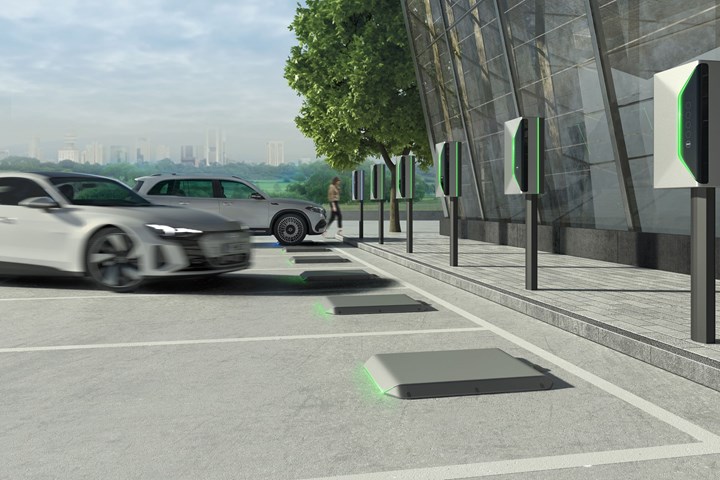Siemens and Mahle Partner to Develop Wireless EV Charging
Mahle will contribute its experience as an automotive supplier and Siemens will use its expertise in the field of charging infrastructure to develop wireless charging stations for electric vehicles.
Share






Autodesk, Inc.
Featured Content
View More

Hwacheon Machinery America, Inc.
Featured Content
View MoreSiemens and Mahle have signed a letter of intent to collaborate in the field of inductive charging of electric vehicles. “Wireless charging of electric vehicles is emerging as a major market for the future. In addition to making life considerably easier for drivers, who no longer have to fiddle with cables and connectors, it is a crucial requirement for the autonomous mobility of tomorrow. The transfer efficiency of wireless, inductive charging is comparable to plug-in systems,” Stefan Perras, head of pre-development and innovation for charging infrastructure at Siemens AG, says.
One aspect of the planned cooperation includes coordinated standardization efforts in the relevant pre-standardization and standardization bodies. The goal is to close gaps to ensure full interoperability between vehicles and the charging infrastructure, according to the companies.
In addition, there are plans to exchange ideas about developing a complete inductive charging system for electric vehicles. Mahle aims to contribute its experience as an automotive supplier and Siemens its expertise in the field of charging infrastructure.
Both parties are also planning extensive interoperability and cross-testing between the charging equipment on the vehicle (secondary coil) and the charging infrastructure (primary coil). This will reportedly enable for technical improvements and validation of inductive charging systems for electric vehicles and ensure interoperability. Some of the testing will be performed as part of publicly funded projects.
As a full-service provider for eMobility charging infrastructure, Siemens eMobility offers a complete range of charging hardware, software and services — from residential to commercial to depot applications. “Siemens’ core expertise in smart buildings and smart grids makes us uniquely positioned to meet our customers’ needs with comprehensive solutions and to help them design, install and manage sustainable charging solutions for a better future,” Perras adds.
Related Content
-
Schwanog Custom Form Tools Reduce Cycle Times
IMTS 2024: Schwanog’s insertable form tool system supports the manufacture of precision parts for industries such as medical, automotive, aerospace and others.
-
The Role of Surface Finishing in Modern Manufacturing: Trends and Best Practices
You’re attending IMTS to advance your business. Regardless of your role in the manufacturing process, considering how your parts will be finished is crucial. This article can help you understand trends in surface finishing and better communicate with your finishing partners.
-
Faster Programming and Training Helps Automotive Shop Thrive
Features that save on training, programming and cycle times have enabled Speedway Motors to rapidly grow and mature its manufacturing arm.



























.png;maxWidth=150)









.png;maxWidth=300;quality=90)


